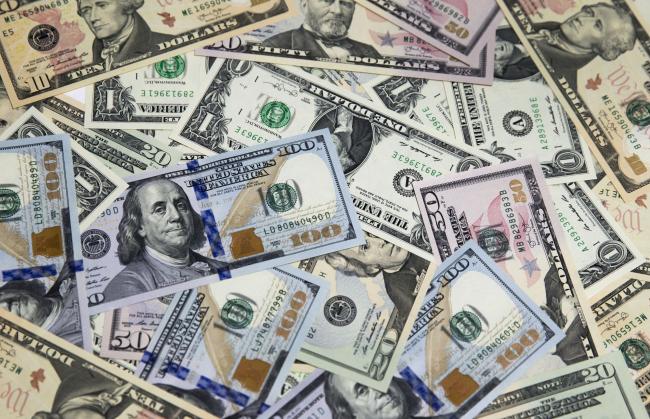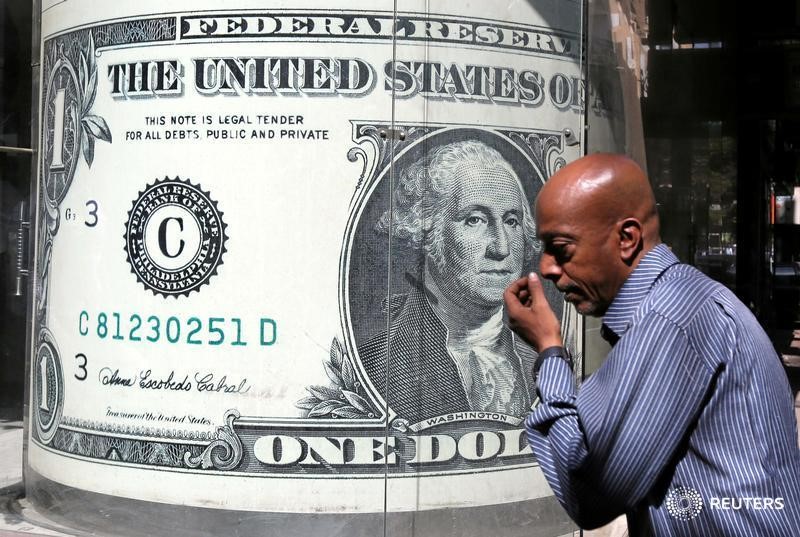(Bloomberg) -- The dollar’s precipitous ascent is about to become an even bigger headache for US companies.
Salesforce (NYSE:CRM) Inc. recently said that it expects foreign exchange to shave off $800 million from its full-year sales, an increase of $200 million from an earlier forecast. That follows comments from the likes of Procter & Gamble (NYSE:PG) Co., which expects a $900 million after-tax hit in the fiscal year ending in June 2023, joining the ranks of American companies bemoaning the dollar’s strength.
The Bloomberg Dollar Spot Index, which measures the currency against a basket of developed- and emerging-market peers, has surged more than 15% this year, hitting new all-time highs this past week and again Monday. The greenback has been gaining as the Federal Reserve has raised interest rates to rein in inflation, causing Treasury yields to rise, and as investors pile into the US as a haven amid the threat of a global growth slowdown.
The move has only accelerated since the start of the third quarter in July, spelling trouble for American companies that generate a big chunk of sales abroad. A stronger greenback diminishes the value of corporations’ foreign revenue when it’s converted back into dollars, while also making their US-made products more expensive in other countries in local currency terms.
“It’s a real headwind,” said Ohsung Kwon, US equity strategist at Bank of America (NYSE:BAC) Securities Inc. “It’s going to be a bigger impact to earnings than it was in Q2.”
The US currency has climbed about 7% so far in the third quarter, following a 5.7% ascent in the three months ended in June. Both the euro and British pound have been tumbling against the greenback over recent weeks, and the Fed’s hawkishness has driven them down still further. Sterling plunged to a low of $1.035 Monday, the weakest on record. The euro, meanwhile, has been consistently trading under parity with the dollar over recent weeks after first breaching the threshold in July as Russia’s war against Ukraine deepens an ongoing energy crisis and raises the chances of a European recession.
Investors sometimes brush off warnings based on foreign-exchange fluctuations, with some market watchers arguing it’s often an excuse for poor performance or only an issue on paper. That isn’t the view of Wolfgang Koester, senior strategist at treasury management software provider Kyriba Corp. He estimates that by the end of the third quarter a group of 1,200 large companies in the US and Europe will have lost more than $60 billion in sales to foreign-currency fluctuations since January. The firms could end up taking on average a 6-cent hit to earnings per share, up from the usual 2 cents to 4 cents.
‘Not Accounting’
“It’s not an accounting issue,” Koester said. “If you sell something and for that you get less in your currency — in dollars, which is where your investors are — you have less money.”
Dollar strength could hurt the profits of about a third of companies on the S&P 500 Index, according to Bloomberg Intelligence, with consumer staples, materials, tech and communications among the most affected industries. What’s more, the share of revenue that index constituents generate from international sources has been on the rise as global trade normalizes after pandemic disruptions. Bank of America uses a general rule that every 10% increase in the dollar translates to a roughly 3% headwind to earnings per share, Kwon said.
Although a strong dollar will hit US company earnings, the converse — currency weakness in Europe, especially the UK — won’t necessarily help firms based in those regions. Retailers ranging from Hennes & Mauritz AG to Asos Plc to Primark owner Associated British Foods (OTC:ASBFY) Plc in recent days have detailed the impact of inflation, which has been fueled by the slump in the euro and the pound, on input costs as well as consumer demand.
Deterioration in earnings per share during periods when the dollar is strengthening tends to coincide with a poor economic outlook, making the greenback an “amplifying or confirming signal rather than the cause,” said Gina Martin Adams, chief equity strategist at Bloomberg Intelligence. She added that a strong dollar suppresses import costs for US companies, with Costco Wholesale Corp (NASDAQ:COST). recently saying that helped “a little bit.”
That has been of little comfort to Salesforce, where Co-Chief Executive Officer Bret Taylor recently characterized currency headwinds as a “total pain.” One of the chief concerns of multinational CEOs is foreign exchange, “a total nightmare right now with the strength of the dollar,” he told investors last week.
The only hope is that the greenback will return to the relative calm of previous years.
“This, too, shall pass,” Taylor said. “The dollar is not going to be this strong forever.”
©2022 Bloomberg L.P.

